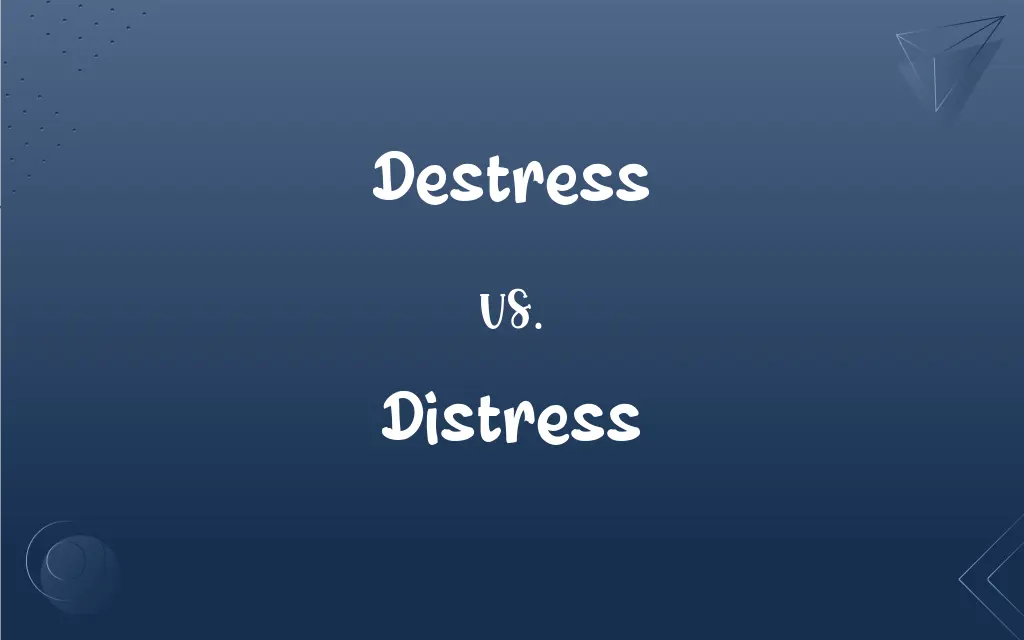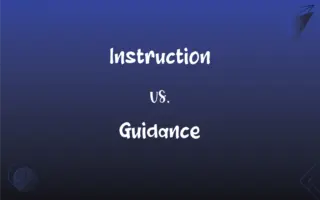Destress vs. Distress: What's the Difference?
Edited by Aimie Carlson || By Janet White || Updated on November 18, 2023
Destress means to relieve tension or stress, while distress refers to extreme anxiety, sorrow, or pain.

Key Differences
Destress involves activities or methods aimed at reducing stress or tension in a person’s life. It implies a positive action towards achieving relaxation or peace. For example, "Yoga can help destress after a long day at work." Conversely, distress signifies a state of extreme anxiety, sorrow, or pain. It represents a negative emotional or physical state, as in "The news of the accident caused her great distress."
Destress is often used in the context of health and wellness, focusing on alleviating the pressures of daily life. It suggests a proactive approach to managing one’s mental or physical wellbeing. "Taking time to destress is essential for mental health." On the other hand, distress can relate to both psychological and physical discomfort, often requiring immediate attention or aid, as in "The paramedics responded to a person in distress."
The term destress is typically associated with leisure, relaxation, and self-care practices. It is about finding balance and tranquility. "Meditation is a popular way to destress." However, distress often implies a more urgent, acute state of suffering or hardship, necessitating intervention, like "The distressed animal was rescued by the team."
Destress implies an improvement or enhancement of one’s state of mind or physical condition. It’s associated with positive outcomes and wellness. "Aromatherapy is used to destress and create a calming environment." Distress, in contrast, is associated with deterioration or worsening of a situation, leading to adverse outcomes. "Financial distress can have serious implications on one’s life."
In essence, destress and distress are opposites in terms of their meanings and implications. Destress revolves around the reduction of stress and promoting peace, while distress is about experiencing severe strain or hardship. "Engaging in hobbies can destress, whereas continuous work without breaks can lead to distress."
ADVERTISEMENT
Comparison Chart
Meaning
To reduce stress or tension
Extreme anxiety, sorrow, or pain
Context
Often used in wellness and relaxation
Associated with urgent, negative states
Connotation
Positive, implying relief and relaxation
Negative, implying suffering or hardship
Usage
Proactive in improving mental or physical health
Describes a reaction to a negative situation
Outcome
Aimed at enhancing well-being
Indicates a state needing attention or aid
ADVERTISEMENT
Destress and Distress Definitions
Destress
To seek relief from daily pressures.
Meditation helps many people destress.
Distress
To cause someone to feel anxious or upset.
The constant noise distressed the residents.
Destress
To engage in activities that promote calmness.
Reading a book is her favorite way to destress.
Distress
Extreme anxiety, sorrow, or pain.
The loss of her pet caused her great distress.
Destress
To reduce or alleviate stress.
She decided to destress with a long bath.
Distress
A state of danger or urgent need.
The ship sent out a distress signal.
Destress
To relax or unwind from tension.
He likes to destress by going for a run.
Distress
To damage or impair something.
The storm distressed the coastline.
Destress
To achieve a state of peace or tranquility.
Gardening is a peaceful way to destress.
Distress
A condition of suffering or adversity.
Economic distress affected the community.
Destress
To relieve one's stress or tension; relax
"After days like that, she'd go home and de-stress by playing video games" (Kristin Henderson).
Distress
To cause strain, anxiety, or suffering to.
Destress
(transitive) To reduce the stresses in a material.
Distress
To mar or otherwise treat (an object or fabric, for example) to give the appearance of an antique or of heavy prior use.
Destress
(ambitransitive) To reduce the stress in oneself or another person.
Destress
(transitive) To reduce emphasis.
Destress
Reduce the emphasis
FAQs
Can destressing prevent distress?
Often, destressing can help avoid distress.
Is distress always negative?
Yes, it indicates a harmful or unpleasant state.
What does destress mean?
To reduce stress or tension.
How can someone destress?
Through relaxation techniques like yoga or meditation.
Is destress a medical term?
It's more common in wellness and self-care contexts.
Can distress be a response to external events?
Often, it's a reaction to stressful or traumatic situations.
Can distress be both mental and physical?
Yes, it can refer to psychological or physical suffering.
Is distress a medical condition?
It can be, especially if prolonged or severe.
Is destress always a deliberate action?
Typically, it involves intentional activities for relaxation.
What does distress mean?
Extreme anxiety, sorrow, or pain.
Can distress lead to other health problems?
Prolonged distress can lead to mental and physical health issues.
Are destressing techniques universally effective?
They vary in effectiveness depending on the individual.
Can children experience distress?
Yes, children can also suffer from distress.
Are there professional treatments for distress?
Yes, counseling or therapy can help manage distress.
Is it easy to destress?
It depends on the individual and their circumstances.
Does distress always need medical attention?
Severe or chronic distress might require professional help.
Does destress have a long-term impact?
Regular destressing can have positive long-term effects.
Can destress methods be part of daily routine?
Yes, many people incorporate them into their daily lives.
What are common signs of distress?
Anxiety, sleeplessness, and irritability are common signs.
Do destress activities require special skills?
Not necessarily; many are simple, like walking or listening to music.
About Author
Written by
Janet WhiteJanet White has been an esteemed writer and blogger for Difference Wiki. Holding a Master's degree in Science and Medical Journalism from the prestigious Boston University, she has consistently demonstrated her expertise and passion for her field. When she's not immersed in her work, Janet relishes her time exercising, delving into a good book, and cherishing moments with friends and family.
Edited by
Aimie CarlsonAimie Carlson, holding a master's degree in English literature, is a fervent English language enthusiast. She lends her writing talents to Difference Wiki, a prominent website that specializes in comparisons, offering readers insightful analyses that both captivate and inform.































































